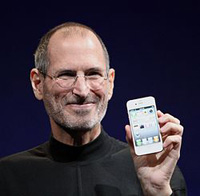
This column has featured many posts on mobile technology during the past two years, with particular emphasis on applications for the iPhone, iPod touch and iPad. This would not have been possible without the vision and creativity of the late Steve Jobs, founder and former CEO of Apple Computer, who passed away yesterday at the age of 56. Jobs transformed our relationship with computers and technology, democratizing access and enabling everyday people to do basic and amazing things.
Prior to Apple Computer’s debut, a select few had the know-how and access to utilize the enormous machines in temperature-controlled rooms at select sites in universities, businesses and government agencies. Jobs and his team at Apple built computers (Apple II, Macintosh, iMac, etc.) with graphical user interfaces (GUI, for short) that simplified interaction between human and machine so that everyday people could own and operate one.
When Steve Jobs gave the 2005 commencement speech at Stanford University, he spoke of his brush with death when he was first diagnosed with pancreatic cancer, which his physician indicated would probably be incurable:
“I lived with that diagnosis all day. Later that evening I had a biopsy, where they stuck an endoscope down my throat, through my stomach and into my intestines, put a needle into my pancreas and got a few cells from the tumor. I was sedated, but my wife, who was there, told me that when they viewed the cells under a microscope the doctors started crying because it turned out to be a very rare form of pancreatic cancer that is curable with surgery.”
Jobs had the surgery and recovered from the cancer.
During the last 2-3 years, medical uses of mobile devices such as the iPhone, iPod touch and iPad have increased dramatically, from interactive medical textbooks, to tracking blood glucose levels, to eye exams, to low-cost medical technology — with too many more examples to name in a single post. Steve Jobs looked beyond what was to what could be done with computing:
“Your time is limited, so don’t waste it living someone else’s life. Don’t be trapped by dogma — which is living with the results of other people’s thinking. Don’t let the noise of others’ opinions drown out your own inner voice. And most important, have the courage to follow your heart and intuition.”
So I tip my hat in tribute to Steve Jobs, whose technological vision and creativity will live on to help many have better health through technology.
(Photo from Wikipedia article on Steve Jobs.)









